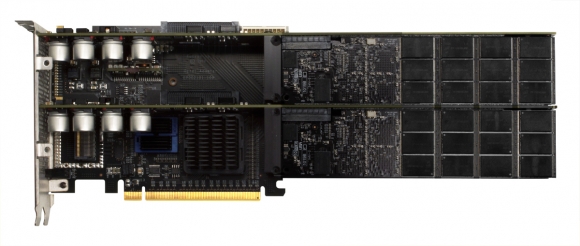Fusion-io's 10 TB Flash Drive Boasts 6.7 GB/s Bandwidth
Fusion-io has doubled the storage capacity in its ioMemory product line with its 10 TB ioDrive Octal.
The drive combines eight 1.28 TB MLC Flash memory modules and is offered in a PCI Express x16 Gen 2.0 Double Wide form factor, which means that the drive consumes two standard PCIe slots. Up to two drives can be integrated in a standard 1U server for a total flash capacity of 20.48 TB.
According to the manufacturer, the 10 TB ioDrive Octal delivers 1.3 million IOPS over a 6.7 GB/s bandwidth. Supported operating systems include 64-Bit Microsoft XP/Vista/Win7/Server 2003/Server 2008, RHEL 4/5/6, SLES 10/11, OEL v5, VMware ESX 4.0/4.1/ESXi 4.1, and Solaris 10 U8/U9 (x64).
"We believe that with the 10 TB ioDrive Octal, even highly data-intensive organizations can house increased amounts of data directly within the server to simultaneously accelerate their business and the efficiency of their data center,” said David Flynn, Fusion-io Chairman and CEO in a prepared statement.
Fusion-io said that the ioDrive Octal will become available in the first quarter of 2012. There was no information on the price of the drive.
Get Tom's Hardware's best news and in-depth reviews, straight to your inbox.

Wolfgang Gruener is an experienced professional in digital strategy and content, specializing in web strategy, content architecture, user experience, and applying AI in content operations within the insurtech industry. His previous roles include Director, Digital Strategy and Content Experience at American Eagle, Managing Editor at TG Daily, and contributing to publications like Tom's Guide and Tom's Hardware.
-
joytech22 Dear GOD.. That's more memory than in my entire system! (4.2TB)Reply
Faster too..
OMG DEAR SANTA.. -
mindless728 "There was no information on the price of the drive."Reply
meaning if you have to ask, you can't afford it -
climber Considering the original Octal drive costs $100K, the next gen one will be 1.5x - 2x more expensive.Reply -
dreamer77dd I wonder when bootable pci 3.0 storage cards will becoming out. like to see some benchmarks on those.Reply
